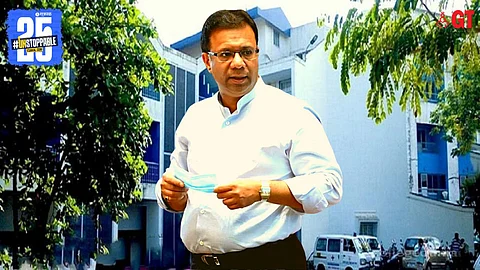

It’s often said that power tends to corrupt. But when power is wielded by those blinded by arrogance, it doesn’t just corrupt, it bulldozes the very foundations of democracy.
That’s precisely what played out at Goa Medical College and Hospital a few days ago. A minister, intoxicated by authority, bypassed every institutional norm and humiliated a doctor on camera, triggering an outcry not just in Goa, but across the country’s medical fraternity.
The incident can be seen as a disturbing precedent and one which doesn't bode well for a country that never stops boasting about its democratic ways and culture.
When Goa's Health Minister Vishwajit Rane humiliated a doctor on the spot during a surprise visit to the Goa Medical College, he did more than just bypass established institutional norms. He shamed the very foundation of how a democracy should function.
The incident can be seen as a disturbing precedent and one which doesn't bode well for a country that never stops boasting about its democratic ways and culture.
Ministers, MLAs, and elected representatives are expected to lead by example. Their role isn’t just to enforce accountability but to live it. Yet, what we saw was a display of unilateral power, a moment of on-camera humiliation, and a complete disregard for the legal process.
No minister has the legal authority to summarily call for suspension of a government employee without following prescribed disciplinary mechanisms, especially in a professional environment like a medical institution that functions under stringent guidelines and protocol.
In case of a complaint, there is a system in place. It has to start with an internal inquiry, a report from the dean, and a structured administrative review.
To leapfrog all of that and pronounce judgment in public view is not only reckless, it is dangerous. It creates a climate of fear, erodes institutional morale, and undermines the dignity of the professionals who keep our systems running.
In case of a complaint, there is a system in place. It has to start with an internal inquiry, a report from the dean, and a structured administrative review.
The minister’s apology, while welcome, does not undo the damage. It must serve as a stark warning to all public servants intoxicated by the illusion of unchecked authority. The democratic mandate is not a badge of entitlement; it is a responsibility to uphold dignity, justice, and procedural fairness.
Unfortunately, this is not an isolated case. Goa appears to be slipping into a culture where elected representatives believe they are beyond reproach, where pushing an activist or humiliating a professional is brushed off like a normal occurrence.
In May, for those who follow the daily news, another incident revealed a similar sense of unchecked entitlement. When parts of Odxel were hit by a landslide and homes were filled with sludge, residents turned to the Taleigao MLA, Jennifer Monserrate, for answers.
Instead of empathy, what one woman activist reportedly received was a shove from the MLA herself. The activist’s only “offence” was demanding accountability and action. Is this how elected representatives engage with the people they have sworn to serve?
The people of Goa must now ask: if a doctor can be humiliated on a whim, who’s next? And who will protect the rights of the citizens and public servants if ministers begin playing judge, jury, and executioner?
The people of Goa must now ask: if a doctor can be humiliated on a whim, who’s next? And who will protect the rights of the citizens and public servants if ministers begin playing judge, jury, and executioner?
Let us be clear, ministership is not a license to bypass guidelines and laws that are in place. It is a position that demands humility, restraint, and adherence to democratic processes.
Surprise visits must not result in surprise suspensions. They must serve the purpose of constructive reform, not end up in public humiliation. There is something called human dignity and it must be respected.
Goa is part of a nation that proudly calls itself the upholder of democratic norms. Our leaders never tire of celebrating this identity, often reminding us of India’s rich democratic values.
Surprise visits must not result in surprise suspensions. They must serve the purpose of constructive reform, not end up in public humiliation.
But such values must be lived, not just confined to speeches. When elected representatives resort to public humiliation or aggression, they betray the very spirit of democracy they claim to uphold.
Incidents like those at the Goa Medical College or in Odxel are not just shameful, they are assaults on the dignity of democracy. If we truly believe in democratic ideals, such conduct by elected representatives in future should not be tolerated. They will have to be shown their place because Goa and Goans deserve better.